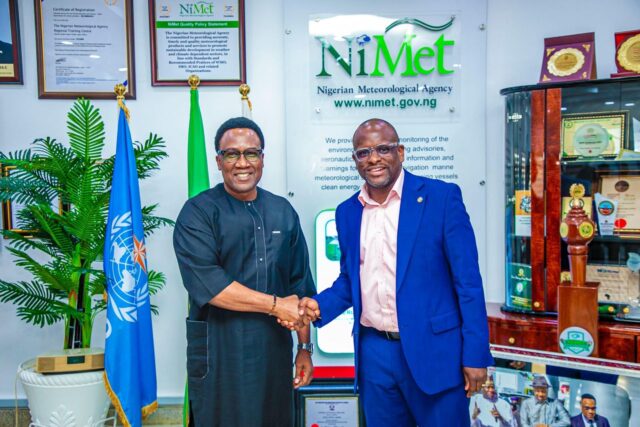The Nigerian Meteorological Agency (NiMet) and the Lagos State Waterways Authority (LASWA) are taking steps to enable climate-smart ferry operations through a proposed strategic partnership.
This initiative is being structured around a Memorandum of Understanding (MoU) designed to integrate real-time weather intelligence into Lagos’ water transport system. The collaboration will strengthen ferry scheduling, improve route planning, and significantly enhance waterway safety.
The Director-General of NiMet, Professor Charles Anosike, received LASWA’s General Manager, Mr. Oluwadamilola Emmanuel, at NiMet’s headquarters in Abuja during a courtesy visit. During the visit, both agencies reviewed the operational objectives of the MoU and shared insights on how climate data can reshape transport safety.
At the heart of the proposed MoU is the deployment of NiMet’s real-time meteorological data across LASWA’s network. This will help reduce weather-related delays, optimize ferry routes, and support safer decision-making for operators and commuters alike.
Professor Anosike stressed the value of collaboration in safeguarding lives and property on the waterways. He said NiMet is fully committed to providing actionable climate intelligence that can drive innovation in maritime transport, especially in a densely populated city like Lagos.
According to Mr. Emmanuel, the partnership is a necessary response to the growing climate risks faced by inland water transport operators. He noted that rainfall intensity, strong winds, and reduced visibility have increasingly disrupted ferry services across Lagos State. Thus, integrating accurate forecasts into LASWA’s framework is not just a safety measure—it is a critical part of building a resilient transport ecosystem.
Beyond data sharing, both agencies agreed that the MoU must include joint training for ferry operators. This will ensure crews can interpret weather advisories and act quickly to avoid preventable incidents. Public awareness campaigns are also being planned to help passengers understand weather-related risks and comply with safety instructions.
Moreover, the collaboration aims to establish a feedback mechanism between NiMet and LASWA. This will help fine-tune weather models with local observations and improve the accuracy of forecasts specific to Lagos waterways.
As cities continue to grapple with the impact of climate change, Lagos is showing leadership by embedding climate intelligence into its transport infrastructure. The climate-smart ferry operations initiative is expected to serve as a model for similar inter-agency collaborations nationwide.
Once signed, the MoU will outline clear roles, data-sharing protocols, and performance indicators to track success. Both parties are optimistic that the partnership will significantly improve ferry reliability and safety across the state’s waterways.
NiMet and LASWA are expected to conclude the formal signing process in the coming weeks, with pilot implementation projected to begin before year-end.
























